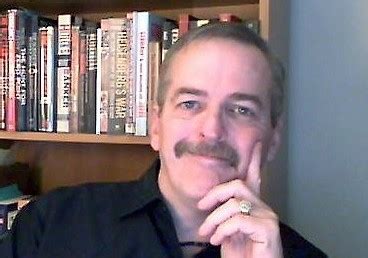A Quote by Joseph P. Farrell
When a man thinks he is reading the character of another, he is often unconsciously betraying his own; and this is especially the case with those persons whose knowledge of the world is of such sort that it results in extreme distrust of men.
Related Quotes
Misanthropy ariseth from a man trusting another without having sufficient knowledge of his character, and, thinking him to be truthful, sincere, and honourable, finds a little afterwards that he is wicked, faithless, and then he meets with another of the same character. When a man experiences this often, and more particularly from those whom he considered his most dear and best friends, at last, having frequently made a slip, he hates the whole world, and thinks that there is nothing sound at all in any of them.
There is a certain sort of man whose doom in the world is disappointment, who excels in it, and whose luckless triumphs in his meek career of life, I have often thought, must be regarded by the kind eyes above with as much favor as the splendid successes and achievements of coarser and more prosperous men.
How do men feel whose whole lives (and many men's lives are) are lies, schemes, and subterfuges? What sort of company do they keep when they are alone? Daily in life I watch men whose every smile is an artifice, and every wink is an hypocrisy. Doth such a fellow where a mask in his own privacy, and to his own conscience?
Where no man thinks himself under any obligation to submit to another, and, instead of co-operating in one great scheme, every one hastens through by-paths to private profit, no great change can suddenly be made; nor is superior knowledge of much effect, where every man resolves to use his own eyes and his own judgment, and every one applauds his own dexterity and diligence, in proportion as he becomes rich sooner than his neighbour.
I think you may judge of a man’s character by the persons whose affection he seeks. If you find a man seeking only the affection of those who are great, depend upon it he is ambitious and self-seeking; but when you observe that a man seeks the affection of those who can do nothing for him, but for whom he must do everything, you know that he is not seeking himself, but that pure benevolence sways his heart.
WISDOM IS dependent upon knowledge. Where there is complete ignorance there can be no wisdom, no knowledge of the right thing to do. Man’s knowledge is comparatively limited and so his wisdom must be small, unless he can connect his mind with a knowledge greater than his own and draw from it, by inspiration, the wisdom that his own limitations deny him. Only God knows all truth; therefore only God can have Real wisdom or know the right thing to do at all times, and man can receive wisdom from God. Wisdom is obtained by reading the mind of God.
I should say that the useful results of science had accumulated, but that there had been no accumulation of knowledge, strictly speaking, for posterity; for knowledge is to be acquired only by a corresponding experience. How can we know what we are told merely? Each man can interpret another's experience only by his own.
For the man who makes everything that leads to happiness, or near to it, to depend upon himself, and not upon other men, on whose good or evil actions his own doings are compelled to hinge,--such a one, I say, has adopted the very best plan for living happily. This is the man of moderation; this is the man of manly character and of wisdom.
How very seldom do you encounter in the world a man of great abilities, acquirements, experience, who will unmask his mind, unbutton his brains, and pour forth in careless and picturesque phrase all the results of his studies and observation; his knowledge of men, books, and nature. On the contrary, if a man has by any chance an original idea, he hoards it as if it were old gold; and rather avoids the subject with which he is most conversant, from fear that you may appropriate his best thoughts.
The nobler sort of man emphasizes the good qualities in others, and does not accentuate the bad. The inferior does the reverse. . . . The nobler sort of man pays special attention to nine points. He is anxious to see clearly, to hear distinctly, to be kindly in his looks, respectful in his demeanor, conscientious in his speech, earnest in his affairs. When in doubt, he is careful to inquire; when in anger, he thinks of the consequences; when offered an opportunity for gain, he thinks only of his duty.































